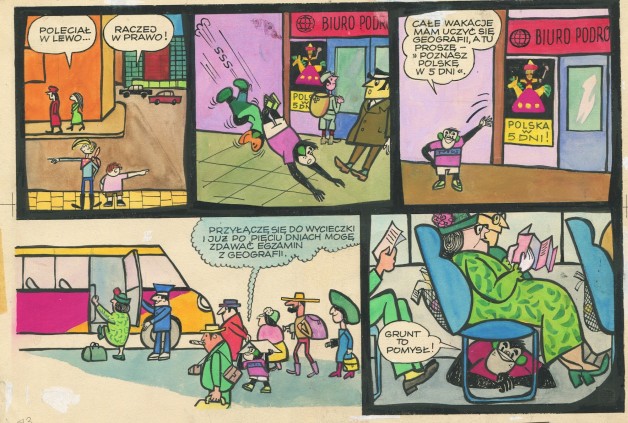A selection of cartoon jokes and scenes by Papcio Chmiel, a critical observer of the transformation of the streets of Warsaw, which provided the backdrop for the adventures of his characters. His works were also a reaction to the social and political changes in Poland. Long before the climate crisis, Papcio was calling for prudence in the use of cars. Alternative vehicles appear in every booklet, but there are also the familiar PKS buses and public transport. In "Islands of Nonsense", people haul trees on trailers, driving around possessed by car madness. Chmielewski has predicted the future and warned us of the dominance of the car with charm and humour.
Chmielewski (Papcio Chmiel) Henryk Jerzy
Papcio Chmiel (Henryk Jerzy Chmielewski 1923-2021) was a Polish graphic artist, illustrator and columnist, author of the cult comic series Tytus, Romek and A'Tomek - the most popular Polish comic strip. The adventures of Tytus are a humourous portrait of the social changes in post-war Poland, from communist modernisation with Cold War tensions in the background, through systemic transformation, to free-market reality and the paradoxes of globalisation. Characteristic motifs of the comic strip are travels in time and space in fancy vehicles and encounters with characters from different eras. In 1947, he started working as a visual artist in the editorial department of "World of Adventures", renamed "Youth World" a few years later. Between 1950 and 1956, he studied at the Academy of Fine Arts in Warsaw at the Faculty of Graphic Arts. He was the author of the continuation of the comic series Sergeant King of the King's Mounted Troops (1947) and comic strips of his own invention Sadełko i Szczudełko (1948), Witek Sprytek (1955-1957) and Cyrk Bum Tarara (1957). He was awarded the Commander's Cross of the Order of Polonia Restituta, the Order of the Smile and the Gold Medal for "Merit to Culture Gloria Artis". He has written three autobiographical books: Urodziłem się w Barbakanie, Tytus zlustrowany and Tarabanie w Barbakanie.
Rok powstania: 1972
From the collection of Wojciech Łowicki

